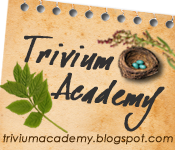I've been bit by the "what to do next year" bug mainly because I want time to find the resources used instead of buying new as much as possible. The longer period of time I have to find used resources, the better.
Next year in 4th, I want to cover physical science and chemistry in one year. I loosely made our science sequence plan based on theory we may use Prentice Hall Science Explorer for 5th-8th. That plan is not set in stone because there may be different curricula that is more appealing for us at that time or I may just find that using a textbook is too stifling. Most importantly, I want to provide our children with a solid science education, especially since I feel it is likely Camille will have an interest in the science field.
In choosing science curricula, my main objective is to find something that will ignite a love of learning about whatever we're studying. Academic level is the second objective, then ease of use for me. Of course, the tone of the material is important and usually weeds out certain curricula- we do not wish to have propaganda either way that any creation theory (evolution, young earth, etc.) is an undisputed fact. I also tend to lean towards well put together curricula that is visually appealing, easy to use with a solid structure and sequence.
I chose God's Design for Life: The World of Plants by Debbie and Richard Lawrence for our 3rd grade botany (in addition to other products) because:
1. Welcoming narrative writing style that I feel comfortable with, I do not feel it talks for me but enables me to engage my child.So for those reasons, I am considering using God's Design for next year's studies on physical science and chemistry. If this is the option I choose, we'd use:
2. The scope of concepts is just the right depth. This is what made me decide against Apologia elementary science curriculum, the amount of terms and the explanations are a better fit from God's Design than Apologia's. I feel Apologia throws a bunch of concepts and terms at a child that is not ready for them to be absorbed, much less remembered in the long term. I don't feel it's worth providing such a deep level of study at the younger ages when it will be repeated again at a more appropriate level. It's not my goal to bog down my child in the elementary level but to ignite a love of learning and make science fun.
3. The text is organized for ease of use, providing a supply list at the beginning of the lesson, text to read, making observations and doing experiments, review questions and an opportunity to do deeper studies. God's Design provides an excellent springboard to add living books without it being too much. I also appreciate the experiments, biographies and historical information included in the text. There is no busywork that consists of word puzzles the like, which is something that irritates me to find in curricula.
4. I can use the lessons as quickly or as slowly as I prefer at whatever depth I deem necessary. We can cover a lesson a day or stretch it out over a couple of days. This flexibility is something unexpected that I have found in the God's Design curriculum although I highly appreciate it.
God's Design for the Physical World
1. Heat and Energy
2. Machines and Motion
God's Design for Chemistry
1. Properties of Atoms and Molecules
2. Properties of Matter for Chemistry
I'd skip the Inventions and Technology this time in favor of Frank Bachman's Great Inventors and their Inventions (we already have). I love Exploring the History of Medicine by John Hudson Tiner so I would like to also include his physics and chemistry books to our studies.
Problem of Quantity
The problem I have created for myself by covering both physics and chemistry in one year is that if we used God's Design, is that we'd have a long study. There are 34-35 lessons per book and while it is doable to use 3 books in 36 weeks, 4 books would push our studies to 46 weeks if we did 3 lessons a week but is more doable at 4 times a week which would be 35 weeks. My concern with doing 4 lessons a week is that we'd be going through concepts very quickly and I feel this would negate the purpose of studying them. Not to mention it would involve 4 different experiments/projects a week, whew!
I prefer two to three lessons a week and we'd slow down as we needed- so two lessons is optimal and if we wanted, we could accomplish three lessons. For this reason, I'm shying away a little from using God's Design. It's not crucial to me to use something that would cause stress to our schedule when there are other alternatives. I'm also a bit concerned about the depth that the chemistry books go in and whether Camille would do well with the concepts. I can only see small glimpses of the book via the samples at Answersingenesis.org.
I have bought a used copy of one of the Chemistry books for God's Design, this will allow me to assess the situation better but I also have alternatives that I would be happy with as well.
For Physical Science- this caught my eye last year, Terrific Science's Teaching Physical Science Through Children's Literature. I love the concept of using children's literature (living books) to teach physical science and the lessons include integrated language arts focuses. Another plus is that there are only 20 lessons AND I could read John Hudson Tiner's Exploring The World of Physics. 20 lessons, 2 times a week would mean that physical science would only take 10 weeks of our year. If I were to use this, we could spend 10 weeks using the curriculum and then read Great Inventors and their Inventions as a main book before moving on to chemistry. Total time spent would be 15 weeks: 10 weeks on Teaching Physical Science and 5 weeks reading Great Inventors.
For Chemistry- Instead of using God's Design, Ellen McHenry's Elements: Ingredients of the Universe (Intro to Chemistry) has caught my eye. The very small sample shows how McHenry uses kitchen staples to signify elements,which I love! I want the idea that chemistry is all around us to be prevalent in whatever resources we use. There are only 7 chapters! Unfortunately, I cannot tell how long it would take to cover a chapter due to the lack of a sufficient sample. If I could keep Elements within 10 weeks, we'd have another 10 weeks to read another living book, The Secret of Everyday Things by Jean Henri Fabre or The Wonder Book of Chemistry by Jean Henri Fabre - which I would decide after our studies to determine which would best suit Camille at that time.
Although others have touted McHenry's Elements curriculum, I feel very leery since I cannot see a better sample. Another solution is to combine God's Design with the alternatives- either using God's Design Physical World OR Chemistry but not both. I will be teaching 4th grade and kindergarten next year so I am looking for a curriculum instead of creating my own, which I could do with the books we have. I'm a little intimidated by chemistry, it's a subject that can easily be delved into too deep.
This where I am currently at with this decision. I hope to read more about others' experiences with these products to better assess what would work best for us.





























5 comments:
They both sound great. I don't know what to tell ya. I do agree that it wouldn't be best to have to cram so many lessons together... it may take the joy out of it for all of you. We are using A Beka again this year. I've noticed that not as many people that I have met in blogland use A Beka or even consider it as a source... unsure why? We went to unit studies for two years but it was harder for my girls to focus for some reason. They really respond well to A Beka and I have always been very pleased with how they show everything from a God perspective... even math. :)
Love the new look of your blog!!
Did you look at Level 1 of Real Science 4 Kids by Rebecca Keller?
The religious content has been removed. The author is Christian and I heard her say at a HS conference that she removed it hoping it may be used in public schools someday. Nothing in the books is anti-God or anti-Christian.
I am pretty sure the only reason it was not included in The Well Trained Mind was that it was published AFTER TWTM.
Keller's ideas are right in line with SWB and JW in the idea of brining hard material usually taught in high school or college down to lower grades. The intent is to teach Bio, Chem and Physics (and soon, Earth Science) once in the elementary gradres, once again in middle school deeper, and deeper still and again in high school. I feel that is so much lik TWTM's history cycle.
We are just starting Physics Level 1 (supposed to be for grades 4-6) with my grade 3 and grade 6 boys.
Each level is not a FULL year curriculum. I am doing that plus using living books for other science topics plus my kids do 156 hours of direct instruction at a homeschool class that is experiential education taught in the outdoors. They learn about plants, animals, birds, Native American skills/primitive skills as well as hiking in the forest, the hills, a beaver pond, exploring the old apple orchard, brook, marsh, swamp, and fields.
I'm going to try to do at least Real Science 4 Kids Physics and Biology this year. I'm going to do a unit on the human body based on David Macaulay's new book that I just blogged about the other day and if we have time, we'll get to the Real Science chemistry Level 1.
BTW I am going to to the HS weekly reports but keep procrastinating. Sorry. I just keep thinking of other stuff to blog about while in my 'blogging time'.
Interesting topic because we are doing a version of physical science/chemistry this year and I have pondered some of these very questions.
We're starting out with Stepping Stones to Science. I love it, but I wonder if it's at few years ahead of their ability. It has stories of great scientists (definitely on level) then it has discussion and experiment sections to work out concepts like lift, force, and gravity.
It's a wonderful curriculum by a scientist and story-teller but I have to lead them through the question and experiment sections a bit more then I like to. Some of the concepts are pretty advanced (wing warp and working out the mathematical equation for the average work expended in 3 jumps).
Since these topics cover flight we're also taking a few weeks off to experiment with paper airplanes and kite-building. We're adding a few stories about Icarus, Chinese kites, and Leonardo daVinci.
I'm also eying The Elements and I think I've convinced myself to add that in if we have time in the Spring. I really enjoyed the excerpt.
Thanks for the other book ideas.I take the same approach with science (evolution/young earth) so it's nice to have a few recommendations.
I second the Real Science 4 Kids series. We're using the Pre-Level 1 Chemistry book this year. I've paired it with Super Science Concoctions for extra experiments (just because we love, love, love experiments!). It has been a HUGE hit around here. My boys get very, very excited when they know it's a science day.
Kathy D.
Post a Comment